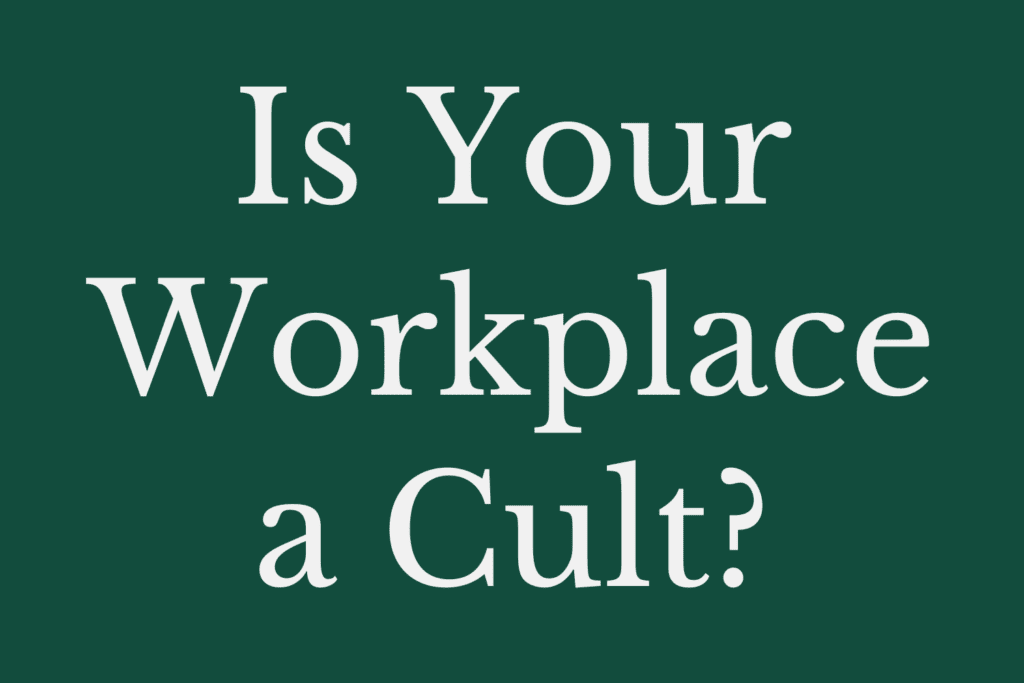The workplace isn’t somewhere commonly associated with ‘cults.’ But a cult can be any group of people bound together by codependent dynamics.
Exploitative cults can form not just around religion, but in politics, self-help groups and in the conventional workplace. Cults are in fact far more common in the modern workplace than many people realise or would like to acknowledge, and it pays to recognise the signs.
A workplace cult can form around any sub-group or team within an organisation, or comprise an entire company.
Here are nine signs that the team or organisation you work for might in fact be an exploitative cult.
1) Your potential is deliberately squandered
All experiences in life can fuel our personal growth. A workplace cult however, whether consciously or not, intends to be a trap. The personal growth of a cult member threatens the codependent dynamic of the workplace, and the way its proponents view themselves. Something that ‘looks like’ growth might be offered, or eluded to, but not the genuine growth that moves one towards personal sovereignty. You might be given a promotion, for example, but the reality brings with it more cultic dynamics, such as those described in this article.
If you sense that management or those around you don’t want you to genuinely grow, this could be a sign that you’re in a cult.
2) You feel an excessive need to please
Workplace cults, like all cults, are led by one or more narcissist cult leaders. They may be grandiose, but are very often more covert and subtle.
As with all codependent dynamics, there is responsibility on both sides. If reflecting honestly you find yourself acting out of a need to ‘please’ the boss, then this is a sign of at least a mild codependency. It might be that the boss themselves is fostering this codependent situation, operating out of an addiction to attention, admiration and validation (i.e. ‘narcissistic supply’) from their employees, rather than what is actually best for the company. In any case, this is something that an employee can cease to give by taking responsibility for their mind. If, on doing so, there are repercussions, then you could be working for a cult.
3) There are subtle or overt attempts to control behaviour
Behavioural control of any kind, whether or not the desired behaviour is aligned to job performance, can be a form of undue influence.
It can include enforcing certain kinds of clothing or hairstyles, inordinate pressures on time and your physical presence, or any kind of expectation about how one should carry themselves. It can also include boozy ‘team meetings’ and other events which posture as wholesome team bonding sessions, but really are, at least in part, about causing physiological impairment and harm, and testing your commitment to the group.
Behavioural expectations are not always overt. They are commonly enforced through emotional manipulation, bullying or veiled threats about what might happen if you don’t toe the line.
Behavioural control is typically employed under the egoic guise of maximising performance, but really it is motivated by a hunger for control and supply. Ultimately this is counter-productive. The self-sovereign individual does not need to adhere to any kind of behavioural code – they will behave exactly as they need to by virtue of being where they are meant to be, and attempts to control their behaviour will only get in their way.
4) Deception and cunning information control are considered normal
Few organisations are entirely open in their sharing of information. But there is a difference between disseminating information skilfully, whilst remaining honest and upfront, vs. controlling the flow of information between parties as a way to maintain control. Cults will routinely withhold, distort, and manage the flow of information as a way to maintain the codependent dynamic, protect the leader’s source of narcissistic supply, and lead employees into decisions that go against their best interests.
Examples of information control would be: one team feeds information to another to pass onto a potential customer, but which later turns out to be untrue; management allows employees to continue working, whilst knowing they do not have the cash to pay salaries; a boss verbally agrees to pay sales commissions, but then reneges when payday comes.
Deception and cunning information control are never necessary in an organisation that is interested in the genuine development of its people. If deception and cunning use of information are just ‘how things are done’ in your workplace, then you could be working for a cult.
5) The boss wants to be seen as ‘the boss’ and encourages projection
We all at some point have had a tendency to look up to others. It’s a natural and necessary behaviour for our development. What a cult leader does not understand, however, is that whenever we look up to someone, we are really seeing an aspect of our own potential, whether or not it is warranted. This could be our inner boss, inner hero, inner sage, our inner Christ, and so on.
The true Sage is one that intends to help you realise the full potential that’s in you, not the one who wants to perpetually draw that projection out and have you place it onto them. The corporate cult leader may identify as one or more of these archetypes, and wants your supply in order to prop up their false self-image.
6) Future-faked visions that never materialise
All healthy organisations need to have an inspiring vision and a plan of how to get there. However there is a difference between a healthy, inspiring vision and a ‘vision’ that is shared with the intention to manipulate behaviour. Future-faking is another form of undue influence used by cult leaders to gain control.
Whether or not the vision is realised is not ultimately what defines it as future-faking. The cult leader likely even believes it themselves, and has repressed all memory of their countless previous ‘visions’ which never materialised. Remember that their ultimate motivation is not to build a successful company, but to obtain validation and admiration through the codependent dynamic. Building a successful company can be a means of achieving that, but where there is conflict, any noble business goal will always subsume to the real goal of obtaining narcissistic supply. Future-faking can be an expedient way to produce exactly that.
Future-faking can range from tantalising hints of promotion and investment in your growth, to grandiose fantasies of how the group is going to shake up the industry or the world.
If you notice a pattern of inspiring visions being shared that remain perpetually un-materialised, then you could be working for a cult.
7) A culture of saying one thing but doing another
This behaviour is not uncommon in the modern workplace. Then again, modern workplace cults are not uncommon. This by itself doesn’t prove that the workplace is a cult, but it does not suggest a culture built on personal sovereignty.
The self-sovereign individual is characterised by very low levels of internal conflict. If there is a culture of saying one thing and doing another, this is a sign that there is a lot of internal conflict playing out, which the respective egos are having to reconcile.
Conflict showing up on a micro scale will inevitably play out on a larger scale, such as in double standards between employees, evading the payment of sales’ commissions, doing inordinate harm to the environment, or any of the forms of undue influence mentioned in this article.
The ego looks for ways to justify decisions that have already been made unconsciously, and it rationalises unethical behaviour. A cult leader, with a false air of wisdom, might suggest that’s ‘just how things are’ in business. But the truth is that the workplace doesn’t make people this way – people make the workplace this way. And workplaces only change when individual people choose to take responsibility for their mind and, in turn, their decisions in life and business.
8) Outside thinking and sense-making are not welcome
Cults control thoughts and behaviour by discouraging individualism and by encouraging group-think. Whilst cultic workplaces will often purport to welcome honest enquiry into their operations and their doctrine, any rational analysis that undermines the codependent dynamic will be rejected and its proponents ostracised.
The same can be said for innovation. All proposals for change in the workplace cult must be assessed in terms of their impact on the boss’s supply. Any changes that would jeopardise their stream of validation and admiration, or force them to examine their unresolved psychological trauma, are avoided. This process plays a role in the stagnation and death of many once great companies.
Cults, by nature, do not make sense. Their egoic need for a ‘one true way’ or otherwise absolutist mode of operating is liable to dissolve on contact with outside thinking. If sense-making is not welcome, you could be working for a cult.
9) After you leave, your old boss tries to ‘hoover’ you
‘Hoovering’ is a manipulation tactic used by narcissists to attempt to ‘suck’ you back into the codependent dynamic.
This is not the same as reaching out with genuine kindness or a professional need. But if an old boss is reaching out because they want you to perceive them like ‘a boss,’ or to feel responsible for your success, or because they experience displeasure at the idea of you succeeding without them, this would be hoovering. At the very least, hoovering might be a reaction by the cult leader to try and expediently regulate whatever unresolved feelings are trying to rise up in them.
Once you have left a workplace and moved on, if the boss tries to ‘hoover’ you, then it is a sign that you might have been in a workplace cult. In which case, good job for moving on. However it is also worth doing the inner work to understand what really attracted you to this place, or your former boss. Without gaining this insight, you are liable to repeat the pattern.
What do to if my workplace is a cult?
If on reading this you think that these signs sound like a lot of modern workplaces, I would agree. Codependent dynamics in the workplace are very common – way more so than many people are willing or equipped to realise.
If you suspect that your workplace might actually be an exploitative cult, the first step would be to establish if that is indeed the case, and to examine the implications of that for your wellbeing and development. No cult is conducive to genuine personal development long-term. They can serve as a productive-looking, effortful form of procrastination that avoids the real work that is to make the unconscious conscious.
Whilst no one can tell you what you should do if you are part of a workplace cult, help is available to support you in:
- finding the set of decisions that are right for you;
- pulling together an exit plan, considering the multitude of complicating factors;
- gaining insight into yourself and what compelled you to this environment;
- establishing yourself in a new way of being that reclaims your self-sovereignty and maximises your personal contribution.
These are areas where a coach can help you. If you suspect you are in a cult, or have left and are in recovery, you are welcome to book a free 30-minute Perspectives Call with me at makeitconscious.com for a quiet conversation.


